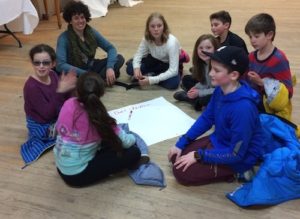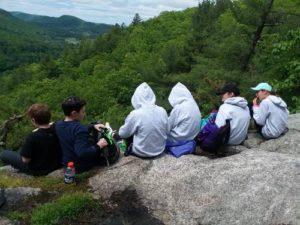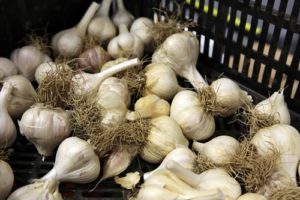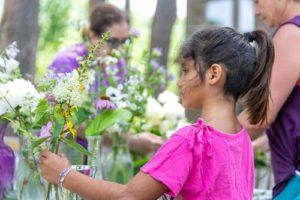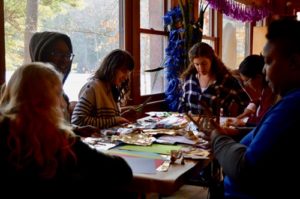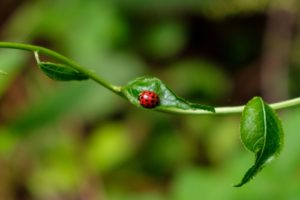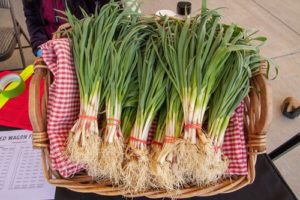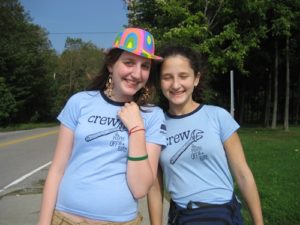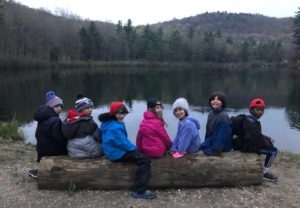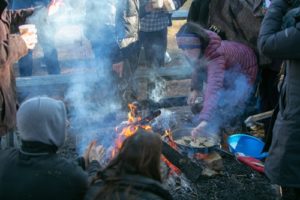Hazon Educational Library: B'nai Mitzvah
TEVA Bingo
by Miki Levran
Pearlstone Center
Discussing the four elements - earth, air, water and sun - participants gained a greater understanding of the world they live in. This is a tool to help introduce the days ahead allowing the participants to get excited for what's to come, to be more engaged during the field trip, to connect to nature in their own way.
Age(s): B'nai Mitzvah, Teens
Pickle Clowns
by Alex Voynow
Jewish Farm School
A pickling workshop taught with the magic of clowning pedagogy!
Matzah Making
by Danielle Smith
Eden Village Camp
Students will learn how to make flour from wheat and make matzah from the flour.
Age(s): B'nai Mitzvah
Beyond Horseradish: Exploring Maror
by Rose Cherneff
Abundance Farm
This program helps us explore and expand our relationship to Maror. After learning through a text study that the definition of Maror is different and also more expansive than we might have thought, participants will get to taste and then plant a wide variety of bitter leaves that could grow in their region in time for Passover.
Ancient Garden Medicinal Herbs
by Leora Cockrell
Camp Tawonga
This program is an introduction to the history and uses of medicinal herbs growing in the Camp Tawonga Garden. Participants will learn about how medicinal herbs connect to self-care and earth-care. Participants will learn about the healing properties of twelve medicinal herbs as well as their cultural and historic uses: Israeli, Mediterranean, Jewish and Native American. Participants will be given the opportunity to and think about what it means to connect both to their herbal heritage as well as the medicinal herbs that grow natively on this land.
Age(s): B'nai Mitzvah, Teens
From the Earth, Back to the Earth: Natural Building with Cob
by Anika Rice
Urban Adamah
Cob is a structural composite of earth-based materials: clay, sand, straw and water. People all over the world have used cob for centuries to sculpt buildings by hand. Learning to build with earth-based materials can broaden participants' understandings of how the earth provides everything that humans need to live. Mixing cob, making cob bricks, or applying cob directly to a larger structure is an embodied means for empowering participants to make things on their own and to source materials sustainably. This lesson also touches on the importance of place in natural building, with a map exploration about how different cultures build with different things based on their environments.
Shabbat, Melachot, and Challah-cover making
by Rachel Aronson
Hazon
This lesson introduces students to traditional Jewish understandings of work and rest. They will understand that ?work? traditionally meant interacting with the environment, and the connection between melachot and shabbat. They will also create challah covers and learn about Shabbat symbols like challah and challah covers.
Age(s): B'nai Mitzvah
We are Shepherds like our Fathers Before Us (Meet the Goats)
by Rebecca Remis
Eden Village West
Through this activity, campers will be able to walk goats to pasture, learn a melody to Psalm 23, and relate shepherding goats to shepherding humans (through social norms).
Etz Chaim: An Exploration
by Sarah Rovin
Pearlstone Center
This program is meant to open up participants to Torah of the forest and the farm, to see where the materials come from and to connect to the beauty and awe of a physical Torah. In the fall on the east coast, the forest comes alive with color, as the trees turn and drop their leaves and their seeds. By exploring and examining a few of the elements that make up our physical Torah, participants will walk away with an altered view and understanding of our most central text.
Pedagogy in Power
by Ren Feldman
Eden Village Camp
The participants will reflect on their personal experiences with 'good' and 'bad' education. Participants will practice learning by making their own personal connections to things and by allowing themselves to notice without making assumptions or conclusions. The participants will read texts about Jewish laws, practice making their own connections, and in teams will create short experiential programs about the texts for each other. Participants will express when and how to apply these methods in educational settings and casual settings.
Category: Group-building
Age(s): B'nai Mitzvah, Teens
Shmita Wild Edibles Cards
by Bailey Lininger
Tamarack Camps
This program is a unique, interactive activity for a festival-style event that combines knowledge of local wild edible plants and the Jewish tradition of Shmita. For this program, the educator creates four unique "trading cards" to pass out at the event, and two examples of local, foraged food. The trading cards serve as a way to get participants interested in the connections between wild edible plants and Shmita, and the food samples demonstrate the ease and accessibility of foraging.
Purim Party: An Eden Village All-Camp Program
by Maya Havusha
Eden Village Camp
The idea behind this program was to bring Purim to life in the middle of summer- a completely unexpected and ridiculously silly idea.The main goal for camp programming is always have fun, but just beneath that is our responsibility to educate our campers and create connections between Judaism, social justice, environmentalism and help them discover who they are (and who they want to be) in this big wild world. This program offers space for all of this! Campers will be split into small groups and have to overcome challenges placed before them, just like Esther did many years ago and begin to think about how they honor themselves, how they care for those around them, and how they stand up for what they believe in.
Saving Creation One Hoshanah at a Time: An alternative Hoshanah Rabbah Ritual
by Shani Mink
Pearlstone Center
This program is an interactive and connective approach to the ritual of Hoshanah Rabbah. Each day of Sukkot we say Hoshanah! meaning 'Please Save Us!?' and so, after learning the basics of Hoshanah Rabbah and exploring the boundaries what we mean when we say 'us', participants will have the opportunity to write their own 'Hoshanot' for the sake of different aspects of creation.
Shofar Stalk: Wandering to Freedom
by Miki Levran
Pearlstone Center
Participants will challenge themselves in this night time activity as they walk blindfolded through the woods towards the blast of the shofar. This will be an experience that allows them to gain more trust within themselves and the world around them without using their strongest sense, sight. While connecting to traditions of other cultures, participants will gain a greater understanding of trust and a sense of what it means to be a wandering Jew by walking towards freedom/light.
Age(s): B'nai Mitzvah, Teens
Lag b’Omer Fire and Forest Festival
by Maya Havusha
Eden Village Camp
Invite the magic of the forest into your life! Celebrate Lag B'Omer, an ancient Jewish festival about survival and spirituality, by rejoicing with our Eden Village community. Explore new forest skills, learn about kabbalah, and of course eat yummy snacks around the fire. With new eyes learn these time tested wilderness survival skills, such as shelter and fire building, making bows and arrows, wild edible walks among others.

